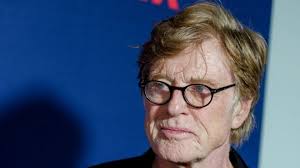Richard Lutz says goodbye to The Sundance Kid and leafs through his own bookshelf in yet another first week of a new year.
Robert Redford says he made his last film, at the age of 82, because he wanted his final acting job…’to be fun’.
Well, The Old Man and the Gun may have been fun for The Sundance Kid. But I have to say it was more like watching someone email in a role when you saw this sluggish film about a pensioner cum bank robber.
It just didn’t work. The script and direction dragged its feet and there were ennui filled longuers where the plot went nowhere. Bright spots were Sissy Spacek and Tom Waits in support in this western-noir about geriatric criminals. Otherwise, a dour farewell whimper for this major star.
Redford knocked about in theatre, TV and minor films before hitting it large in Butch Cassidy and the Sundance Kid. It’s now fifty years old and still jumps off the screen with its wink and nudge script and its wry humour. Even then, though, there were hints of Redford’s downbeat side. He made few comedies. Those he was in, didn’t fly.
But he scooped Oscars for acting, scooped more for directing and was the driving spirit of the innovative Sundance Film Festival. And according to someone I knew well, Robert Redford was a fair poker player too who really wanted to be a painter: “Sitting around a Sunday night poker table with Bob was as easy as eating apple pie,” the source told me. A nice image, that.
 Meanwhile, this first week of a new year allows me to scroll through my meagre book list, those that I have devoured, chomped through or slogged through for the past 12 months.
Meanwhile, this first week of a new year allows me to scroll through my meagre book list, those that I have devoured, chomped through or slogged through for the past 12 months.
There were some clunkers, some works of real fire and genius. Terrific reads include the hilarious semi-fictional bio of Princess Margaret called Ma’am Darling. Writer Craig Brown imagines her private diary, the spiteful gossip of her louche friends and, also, some real remembrances. It is at once funny, sad and a terrific insight into late twentieth century snobby Britain. What a wasted life.
Also great was Evelyn Waugh’s Remote People. This is a diary from 1936 when the English author recollected his journey through Ethiopia, Kenya and then Tanganyika. He is a beautiful elegant and self effacing writer who, despite his notorious reactionary views, proved pretty enlightened with his insights into British colonialism and how it must end – immediately.
A third beauty was East West Street by British human rights lawyer Phillip Sands. He is a natural writer and story teller. Here, he intertwines three strands of documented history; his Jewish family’s ordeal in Eastern Europe under the Nazis; how two young lawyers from a single Polish town surfaced to create international human rights legislation; and, lastly, the tale of how one German officer got his comeuppance for crimes against humanity by knowingly operating a death camp.
It is a brutal, shocking narrative about a time in our collective history that can’t be forgotten. Sands’ attitude seems to be: ‘Don’t get angry. Just write it down.’ And he does, methodically, carefully and accurately.
I won’t go into the loser books. The clunkers. There were one or two too many and it would sully the above trio of books that glows for me in 2018. Let’s just say there is certainly some bad writing out there.




I myself, being now a lady of leisure, (yes done with my job), am enjoying EM Forster, and thinking about England.